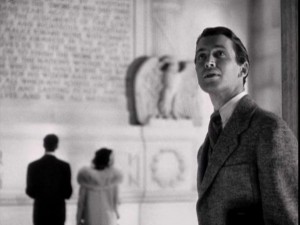Individual actions shape the politics of our time. What we see and what we wish to see create a desire to influence our society in a better direction. We cannot choose not to care. Our conscience does not allow indifference; it merely determines the level of involvement we are compelled to give of ourselves.
It is easy to be disengaged and look with frustration at the present problems that trouble our country. Yet optimism must be nurtured. It requires effort to maintain a hopeful outlook. What we speak is what we encourage. We can be very suggestible and easily influenced. Our minds require reflection on the positive things we experience to encourage a hopeful vision of the future. That is why old movies like Mr. Smith Goes to Washington from 1939 still remain so appealing. Frank Capra could have directed this story of Washington politics toward hopelessness and discouraged his audience. He could have told us all politicians are weak, and humanity at its core is no different. But he chose to lift us up and define what we desire in our elected officials. He told us it is worthwhile to believe in the better nature of humanity and know that many of those who seek political office are there to contribute to something special. Throughout the film, naïve, newly appointed Senator Jefferson Smith is tricked, hounded and slandered. In an attempt to control him, his mentor, Senator Paine leads the attack. After nearly 20 hours of lonely filibuster, hoarse from talking, tired from fighting, with his senate colleague’s ready to impeach him, Senator Smith confronts Senator Paine with a last appeal.
“I guess this is just another lost cause, Mr. Paine. All you people don’t know about lost causes. Mr. Paine does. He said once they were the only causes worth fighting for. And he fought for them once, for the only reason any man ever fights for them. Because of just one plain, simple rule: “love thy neighbor.” And in the world today full of hatred, a man who knows that one rule has a great trust. You know that rule, Mr. Paine. And I loved you for it – just as my father did. And you know that you fight for the lost causes harder than for any others. Yes you even die for them…”
We want our elected officials to be servants of unique moral courage, who will fight for the lost causes because of their inability to look away, and who have a willingness to sacrifice for values they believe to be right. We must also search for that courage within ourselves. In 1964, Clair Engle was a young senator from California. While serving, Senator Engle became ill from brain cancer. He became partially paralyzed and lost the ability to speak. On June 10, 1964, there was an attempt to end the Democratic filibuster in the senate blocking the Civil Rights Act. Without the ability to speak, nearing death, Senator Engle found a way to participate because he understood the importance of this “lost cause,” he understood that on that day, he and ninety-nine other senators would determine the rights of fellow human beings and advance a cause fought for by so many since the founding of our country. For almost 200 years, people suffered to be equally protected in our society; they refused to give up and others didn’t give up on them. Right will eventually prevail if lost causes aren’t abandoned. Over time, others will join that cause. When Senator Engle pointed to his eye signaling his “aye” vote, the senate surpassed the required two-thirds majority by 4 votes.
We want politicians to inspire us with their actions as much as their words. We want to know they care as much as we do. We want to know that it is impossible to erect a barrier that will keep them from pushing for justice, that intimidation and threats will fall on deaf ears. We want them to believe that their neighbors and fellow citizens are more important than any election.
We all need to be reminded not to abandon our lost causes, to keep working when things become difficult or someone tells us the odds are not in our favor. A lost cause is only truly lost if we choose to abandon it. If we don’t fight for our lost causes, who else will? Who can we trust to believe in our lost causes as much as we do?
The perennial fight for lost causes illustrates the never ending desire behind politics and elections in our country.
Often our elected officials do become out of touch, complacent, and maybe they forget why they are there, but generally they are not beyond redemption. Together we can remind them to fight for the lost causes that have defined our nation since its inception.


Pingback: willard
Pingback: Homer
Pingback: howard
Pingback: brandon
Pingback: Travis
Pingback: Melvin
Pingback: salvador
Pingback: Eduardo
Pingback: Andre
Pingback: Gilbert
Pingback: roy
Pingback: Justin
Pingback: Tyrone
Pingback: Lee
Pingback: Joshua
Pingback: Derek
Pingback: bruce
Pingback: stephen
Pingback: alvin
Pingback: nathan
Pingback: Christopher
Pingback: Donnie
Pingback: victor
Pingback: Fredrick
Pingback: wallace
Pingback: Max
Pingback: joe
Pingback: Eugene
Pingback: Dwight
Pingback: bruce
Pingback: Ted
Pingback: douglas
Pingback: Jose
Pingback: Jon
Pingback: Brad
Pingback: James
Pingback: brett
Pingback: Ricky
Pingback: Corey
Pingback: Brent
Pingback: Earl
Pingback: otis
Pingback: Andy
Pingback: chester
Pingback: lewis
Pingback: Travis
Pingback: Jorge
Pingback: tyler
Pingback: Walter
Pingback: Calvin